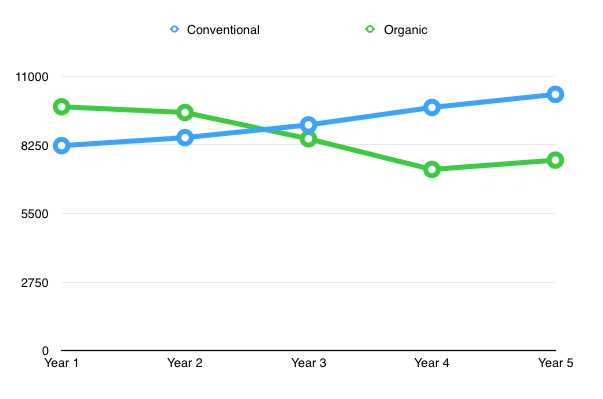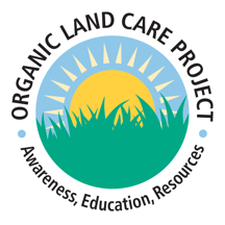The true cost of an organic transition plan depends on many variables.
Some of these include:
An organic landscape transition is possible within any budget. There is not just one organic program, but rather different programs with different levels of intensity that can be created to meet the needs of any situation.
TURF MANAGEMENT
In general, once established, organic managed turf can be more cost effective than conventionally managed turf. While the initial costs of transitioning a chemical-dependent turf to organic will be higher, costs will be lower in the long-run as inputs like fertilizer and water decrease. Additionally, annual chemical treatments will decrease and off-set the costs of organic inputs.
In a cost comparison study of chemical turf management and organic turf management for school athletic fields, analysis demonstrated “that the cost of a natural turf management program is incrementally higher in the first two years, but then decreases significantly as soil biology improves and water requirements diminish. Total expenditures over five years show a cost savings of more than 7% using natural turf management, and once established, annual cost savings of greater than 25% can be realized.”
A Comparison of Costs for Conventional and Natural Turf Programs Over A Five-Year Period
Some of these include:
- aesthetic expectations of a given space
- length of time wanted for transition
- labor costs
- product choice
- soil quality - which is directly related to the current conventional program
- water quality
- existing contract costs
- whether the cultural practices and product applications will be done in-house by municipal staff or will be contracted out
An organic landscape transition is possible within any budget. There is not just one organic program, but rather different programs with different levels of intensity that can be created to meet the needs of any situation.
TURF MANAGEMENT
In general, once established, organic managed turf can be more cost effective than conventionally managed turf. While the initial costs of transitioning a chemical-dependent turf to organic will be higher, costs will be lower in the long-run as inputs like fertilizer and water decrease. Additionally, annual chemical treatments will decrease and off-set the costs of organic inputs.
In a cost comparison study of chemical turf management and organic turf management for school athletic fields, analysis demonstrated “that the cost of a natural turf management program is incrementally higher in the first two years, but then decreases significantly as soil biology improves and water requirements diminish. Total expenditures over five years show a cost savings of more than 7% using natural turf management, and once established, annual cost savings of greater than 25% can be realized.”
A Comparison of Costs for Conventional and Natural Turf Programs Over A Five-Year Period
Costs for an organic transition will vary depending on the size of the site. The level of expectation will dictate the level of maintenance, with a high expectation requiring the most labor and product cost. See also:
Natural grass playing field case study: Springfield, MA
Natural grass playing field case study: Marblehead, MA
COST OF ORGANIC TRANSITION FOR HARDSCAPES AND PLANTER BEDS
The cost of eliminating synthetic pesticides for hardscapes and planter beds will vary depending on the alternative method(s) implemented. There is no one way to transition. Some contractors use a combination of hand pulling, weed whacking, and a 25(b) exempt or certified organic pesticide, while others invest in a steam machine.
When evaluating a cost-effective program, it’s important to consider the current labor costs associated with the mixing of chemicals, employee sick days possibly due to pesticide exposure, employee satisfaction and performance. For example, does investing in a steam machine cut down on man hours? How long until a steam machine’s costs are recovered as compared to the never ending synthetic chemical costs? It’s important to look at the big picture and not just product to product costs, or how many labor hours are required to pull weeds, for example.
THE COST OF NOT GOING ORGANIC
The costs of synthetic pesticide and fertilizer exposure to the environment and human health are difficult to fully measure. Knowing that chronic exposure to pesticides directly impacts children and pets that come into contact on an intermittent basis, imagine the health impacts for pesticide applicators. With the recent lawsuits surrounding Roundup® and the public awareness surrounding pesticide exposure, it is logical to assume more lawsuits will unfold. As a contractor or municipal employee, this could pose a liability risk and potential lawsuit if an employee or community member is diagnosed with a chronic illness. It is in the best interest of any business to minimize risk and protecting employees and the community from harmful chemicals would be a step in the right direction.
Download a PDF version of this article Cost PDF


